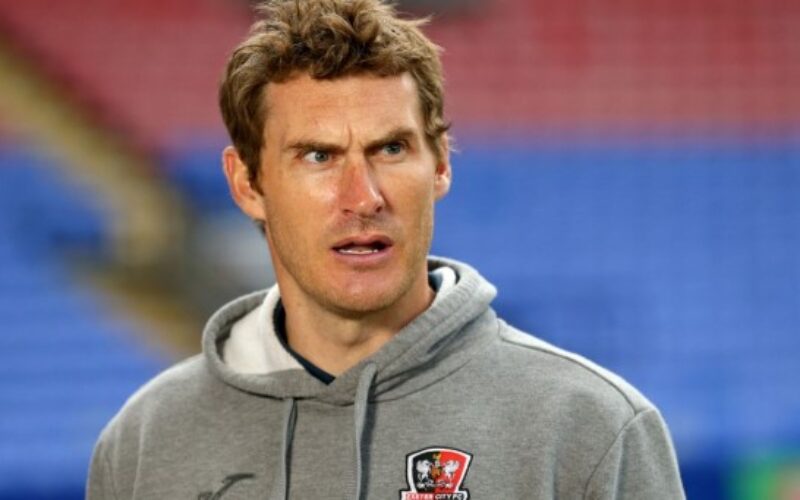Matt Taylor understands the reality of managing Exeter City.
Whether it is the realities of recruitment, losing players, trying to get players to move to Devon or even seeing new squad members deal with the unpredictable weather in the South West.
“It rained for the first time in a couple of months!”
he tells League of 72. “Everyone was speaking about the Indian summer, but as soon as October comes the rain comes. A few of our players mentioned this morning it was the first time they’ve seen rain in Devon.
“I saw a woolly hat for the first time in months. Jevani Brown had one on. But he said it was more to protect his hairstyle than to keep him warm. There have been no tights or gloves yet, but I’m sure they’re not too far away.
“Being a northerner myself we pride ourselves on being a little bit tougher, but the new generation of players are different! They’ve got to be comfortable and relaxed for training. But obviously when the real work starts we ask them to take the hats off.”
The more significant reality of leading Exeter City is understanding the club’s place in the food chain. They pride themselves on their work with the academy, but understand a raft of talent will leave every year or two in order to keep the club in motion.
It is probably why they have been stuck in League Two since 2012, and have endured several heartbreaking near misses in terms of trying to seal promotion in that time. They have lost three of the last five play-off finals, and finished just outside of the top seven in the other two seasons in that time.
Now Taylor has had to build a squad to challenge again, having parted company with large chunks of his previous first team over the summer.
“In terms of the turnover of the club in the off-season, we lost some influential players,” he says. “The likes of Jake Taylor, Ryan Bowman, Joel Randall. They were significant players to lose. Whenever you recruit a larger number than usual it takes a bit of time. The squad was very thin.
“We knew there would be interest in Joel Randell. We made a decision to sell Ryan Bowman, it was his time to move on and play at a higher level. They all went on with our best wishes.”
It speaks volumes of the work Taylor is doing that once again this season, with 14 new arrivals in the summer, they are still nearer the right end of the table.
He refers to the difficulty in getting the right type of player in – especially when most look at a map of Britain and see how far away St James Park is from where they were before, or where in the country they come from.
“It’s forever evolving and changing here,” Taylor says of their transfer strategy. “You can never get like for like.
“There is always a reason a player signs for Exeter City. And with no disrespect to our club it is probably because they need it to happen, and they need success when they come here.
“Either they are young and need an opportunity, or they are at a certain stage at the latter end of their career, where they have had a fantastic career to date but they are looking at what’s next and how they can prolong it.
“It’s then up to myself as a manager to get the right balance for the squad. We’ve always got a good foundation of academy players, and over half of the first-team squad are made up of them, and often over half of the side on a matchday. It’s the perfect foundation for us to build on.”
While it may be frustrating to some fans who are desperate to seek a return to League One after so long in the fourth tier, Taylor knows the fan-owned club will never compromise or risk its future for quick gains.
It is why past academy stars, such as Ollie Watkins and Ethan Ampadu, are moved on at the right time. It is why Exeter will hopefully never run into the same financial troubles as so many other Football League clubs.
“We have to keep selling players because it is essential to our survival,” Taylor says. “We’re owned by the trust and have no chairman putting money in. Anything we generate is put back into the club.
“We have to keep selling players. It’s our best way of improving all aspects of the club. We want to keep hold of our good young players and sell them when the time is right.
“But it fills us with pride when they often go on to bigger and better things, and even go on to play Premier League and international football.”
